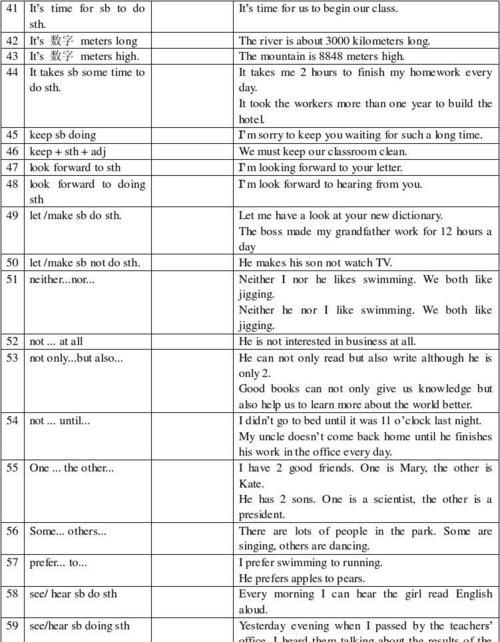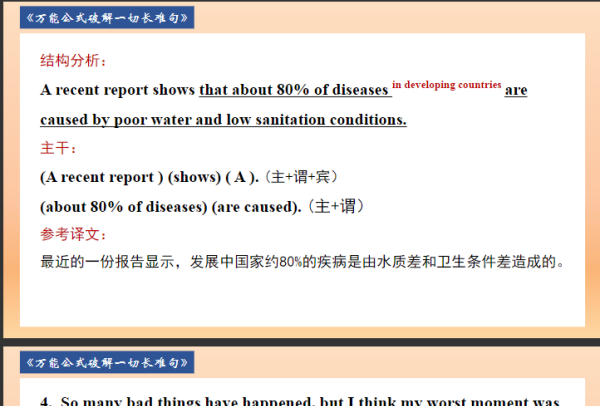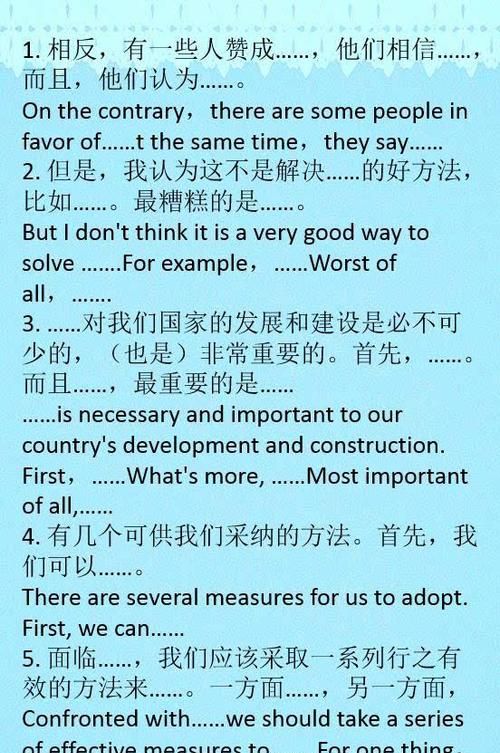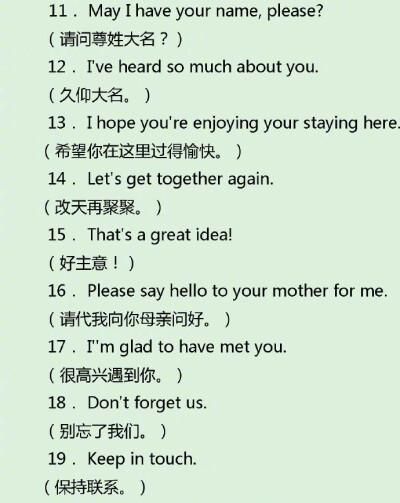本文目录
什么是英语高级句型
展开1全部
有一篇文章《50个英语高级句型》,你点击【百度】,就可找到,很实用,有例句!我有下载,你需要,我可以发给你!只是,作为回答内容,提交时不能通过。
1. 主语+否定谓语,not + 同前主语 用语加强否定语气。
I’ll not do such a thing, not I.
He won’t break his word, not he.
Tom can’t speak Russian, not he.
2. 主语+否定谓语+much less/still less +词组或从句 用语进一步否定。
I could not assent to, much less participate in such proceedings.
He doesn’t like music, still less/much less dancing.
I didn’t even see him, still less/much less shake hands with him.
3. 主语+否定谓语+to say nothing of/not to speak of/not to mention +名词
主语+否定谓语+let alone+名词或从句 用语进一步否定。
He doesn’t know English, to say nothing of German or French.
I don’t know algebra or geometry, not to mention calculus.
I never thought of it, let alone (much less/still less) did I do it.
4. 半否定词+or/if+否定代词或副词 表示半否定或让步否定。
Few, however, if any, besides the King himself, believed that Hermione was quilty.
I saw little or nothing of him after you were gone.
She seldom or never (if ever) made a mistake.
Peter read little or nothing (little if anything) in summer vacation.
Mr. Morris seldom or never went out.
5. 主语+cannot + but/choose but/help but +动词原型 意为“不得不,别无选择”。
I cannot but admire his courage.
We can’t (choose) but admit that in certain aspects of science and technology they are ahead of us.
We can’t but read books to increase our knowledge.
6. (There be)No+主语+but+谓语+其它 双重否定表示强烈之肯定。
(其中but 相当于who...not, that...not, which...not)
There is no man but has his faults.
(There is no man who doesn’t have his faults.
There is no man without faults.
All men have faults.)
(There is) Nobody but has his faults.
There is no rule but has exceptions.
There is nobody but knows this matter.
7. A分句(否定)+ but + B分句(肯定) 借否定来强调肯定。
It never rains but pours.
She never comes but she brings us something to eat.
They never met but they fought.
8. 主语+be + the last + 名词+从句/to do
He is the last person to say that.
You are the last woman that I want to marry.
That is the last place where I expected to have met you.
Lying is the last thing that he is likely to do.
祝你开心如意!O(∩_∩)O~~

高中英语高级句型及例句仿写


一. 表达个人观点句型
1.As far as I am concerned, I agree with the latter opinion to some extent.
就我而言,在某种程度上我同意后者的观点。
2. As far as I am concerned, I am really/completely in favor of the test/policy.
就我而言,我真的/完全支持这场测试/这个政策。
3. In conclusion/a word, I believe that…
总之,我相信......
4. There is some truth in both arguments, but I think the disadvantages of…outweigh its advantages.
这两种观点都有一定的道理,但我认为……的缺点超过了它的优点。
5. In my opinion/view, we should...
在我看来,我们应该......
二. 原因分析型常用句型
1. There are several reasons for…, but in general, they come down to three major ones...
有一些原因,但总的来说,归结为三大原因。
2. There are many factors that may account for…, but the following are the most typical ones.
有很多因素可以解释...…,但以下是最典型的因素。
3. Many ways can contribute to solving this problem, but the following ones may be most effective.
许多方法可以有助于解决这个问题,但以下的可能是最有效的。
4. Generally, the advantages can be listed as follows.
一般而言,优势可以列举如下。
三. 因果推理常用句型
1. Because/Since we read the book, we have learned a lot.
因为我们读了这本书,我们学到了很多。
2. If we read the book, we will learn a lot.
如果我们读这本书,我们就会学到很多。
3.
We read the book; as a result / therefore / thus / hence / consequently
/ for this reason / because of this, we’ve learned a lot.
我们读了这本书,因此/因为这个原因/,因为这,我们学到了很多。
4. As a result of /Because of/Due to/Owing to reading the book, we’ve learned a lot.
由于读了这本书,我们学到了很多。
四. 结合全文归纳总结句型
1. From what has been discussed above, we may safely draw the conclusion that…
通过上面的讨论,我们可以得出结论......
2. Taking into account all the factors, we may safely come to the conclusion that…
考虑到所有的因素,我们可以得出结论......
3. Judging from all the evidence offered, we may safely arrive at/reach the conclusion that…
从所提供的所有证据来看,我们可以得出结论......
4. All the evidence supports a sound conclusion that…
所有的证据都支持可靠的结论......
5. From what is mentioned above, we may come to the conclusion that…
从上面提到的,我们可以得出这样的结论......
英语常用句式
展开1全部
英语写作常用句式一、~~~ the + ~ est + 名词 + (that) + 主词 + have ever + seen ( known/heard/had/read, etc)~~~ the most + 形容词 + 名词 + (that) + 主词 + have ever + seen ( known/heard/had/read, etc) 例句:Helen is the most beautiful girl that I have ever seen.海伦是我所看过最美丽的女孩。Mr. Chang is the kindest teacher that I have ever had.张老师是我曾经遇到最仁慈的教师。二、Nothing is + ~~~ er than to + V Nothing is + more + 形容词 + than to + V例句:Nothing is more important than to receive education.没有比接受教育更重要的事。三、~~~ cannot emphasize the importance of ~~~ too much.(再怎么强调...的重要性也不为过。) 例句:We cannot emphasize the importance of protecting our eyes too much.我们再怎么强调保护眼睛的重要性也不为过。四、There is no denying that + S + V ...(不可否认的...)例句:There is no denying that the qualities of our living have gone from bad to worse.不可否认的,我们的生活品质已经每况愈下。五、It is universally acknowledged that + 句子~~ (全世界都知道...)例句:It is universally acknowledged that trees are indispensable to us.全世界都知道树木对我们是不可或缺的。六、There is no doubt that + 句子~~ (毫无疑问的...)例句:There is no doubt that our educational system leaves something to be desired.毫无疑问的我们的教育制度令人不满意。七、An advantage of ~~~ is that + 句子 (...的优点是...)例句:An advantage of using the solar energy is that it won't create (produce) any pollution.使用太阳能的优点是它不会制造任何污染。八、The reason why + 句子 ~~~ is that + 句子 (...的原因是...)例句:The reason why we have to grow trees is that they can provide us with fresh air./ The reason why we have to grow trees is that they can supply fresh air for us.我们必须种树的原因是它们能供应我们新鲜的空气。九、So + 形容词 + be + 主词 + that + 句子 (如此...以致于...)例句:So precious is time that we can't afford to waste it. 时间是如此珍贵,我们经不起浪费它。十、Adj + as + Subject(主词)+ be, S + V~~~ (虽然...)例句:Rich as our country is, the qualities of our living are by no means satisfactory. {by no means = in no way = on no account 一点也不}虽然我们的国家富有,我们的生活品质绝对令人不满意。十一、The + ~er + S + V, ~~~ the + ~er + S + V ~~~ The + more + Adj + S + V, ~~~ the + more + Adj + S + V ~~~(愈...愈...) 例句:The harder you work, the more progress you make. 你愈努力,你愈进步。 The more books we read, the more learned we become. 我们书读愈多,我们愈有学问。 十二、By +Ving, ~~ can ~~ (借着...,..能够..) 例句:By taking exercise, we can always stay healthy. 借着做运动,我们能够始终保持健康。 十三、~~~ enable + Object(受词)+ to + V (..使..能够..) 例句:Listening to music enable us to feel relaxed. 听音乐使我们能够感觉轻松。 十四、On no account can we + V ~~~ (我们绝对不能...) 例句:On no account can we ignore the value of knowledge. 我们绝对不能忽略知识的价值。 十五、It is time + S + 过去式 (该是...的时候了)例句:It is time the authorities concerned took proper steps to solve the traffic problems. 该是有关当局采取适当的措施来解决交通问题的时候了。 十六、Those who ~~~ (...的人...) 例句:Those who violate traffic regulations should be punished. 违反交通规定的人应该受处罚。 十七、There is no one but ~~~ (没有人不...) 例句:There is no one but longs to go to college. 没有人不渴望上大学。 十八、be + forced/compelled/obliged + to + V (不得不...) 例句:Since the examination is around the corner, I am compelled to give up doing sports. 既然考试迫在眉睫,我不得不放弃做运动。 十九、It is conceivable that + 句子 (可想而知的) It is obvious that + 句子 (明显的) It is apparent that + 句子 (显然的) 例句:It is conceivable that knowledge plays an important role in our life. 可想而知,知识在我们的一生中扮演一个重要的角色。 二十、That is the reason why ~~~ (那就是...的原因) 例句:Summer is sultry. That is the reason why I don't like it. 夏天很燠热。那就是我不喜欢它的原因。 二十一、For the past + 时间,S + 现在完成式...(过去...年来,...一直...) 例句:For the past two years, I have been busy preparing for the examination. 过去两年来,我一直忙着准备考试。 二十二、Since + S + 过去式,S + 现在完成式。 例句:Since he went to senior high school, he has worked very hard. 自从他上高中,他一直很用功。二十三、It pays to + V ~~~ (...是值得的。) 例句:It pays to help others. 帮助别人是值得的。 二十四、be based on (以...为基础) 例句:The progress of thee society is based on harmony. 社会的进步是以和谐为基础的。 二十五、Spare no effort to + V (不遗余力的) 例句:We should spare no effort to beautify our environment. 我们应该不遗余力的美化我们的环境。 二十六、bring home to + 人 + 事 (让...明白...事) 例句:We should bring home to people the value of working hard. 我们应该让人们明白努力的价值。 二十七、be closely related to ~~ (与...息息相关) 例句:Taking exercise is closely related to health. 做运动与健康息息相关。 二十八、Get into the habit of + Ving = make it a rule to + V (养成...的习惯) We should get into the habit of keeping good hours. 我们应该养成早睡早起的习惯。 二十九、Due to/Owing to/Thanks to + N/Ving, ~~~ (因为...) 例句:Thanks to his encouragement, I finally realized my dream. 因为他的鼓励,我终于实现我的梦想。 三十、What a + Adj + N + S + V!= How + Adj + a + N + V!(多么...!) 例句:What an important thing it is to keep our promise! How important a thing it is to keep our promise! 遵守诺言是多么重要的事! 三十一、Leave much to be desired (令人不满意) 例句:The condition of our traffic leaves much to be desired. 我们的交通状况令人不满意。

用英语句型造句子
展开1全部
for example:
1.want sb/sth(想要某人/某物)
I want that book which on the bookcase.(我想要那个在书架上的书。)
I want her.(我想要她)
2.want to do sth(想要做某事)
I want to have a picnic(我想去野餐)
3.would like to do sth(想要做某事,与want to do sth相同,但是更有礼貌)
I would like to eat lunch.(我想去吃午餐)
4.like to do sth=like doing sth(喜欢做某事)
I like to play soccer=I like piaying soccer(我喜欢踢足球)
注:want to do sth与would like to do sth中都可加人(宾格)
want sb to do sth=would like sb to do sth(想让某人做某事)
I want him to help me=I would like him to help me(我想要他来帮助我)
祝你学习进步

以上就是关于20个英语高级句型及造句 ,什么是英语高级句型的全部内容,以及20个英语高级句型及造句 的相关内容,希望能够帮到您。
